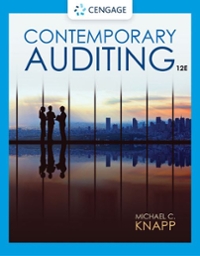Frank Coleman pounded away at his calculator as he tried in vain to reconcile his number for
Question:
Frank Coleman pounded away at his calculator as he tried in vain to reconcile his number for the LIFO reserve to the figure recorded by the client.1 Frustrated and fatigued, Frank glanced at his wristwatch; he couldn't believe it was 9:40 p.m. Frank immediately stood and began shuffling together the workpapers spread out before him on his desk. No doubt, Maggie, his wife of two months, would be upset that he had stayed so late at work, again. Fortunately, Frank and Maggie's home was only a 15-minute drive from his client's corporate headquarters in downtown Dallas.
One of his employer's longtime clients had decided to go public, and Frank was assigned to the S-1 audit engagement. Because the company's management team had developed an overly optimistic schedule for filing its S-1 registration statement with the SEC, Frank and the other members of his audit team were putting in 70-hour work-weeks in the middle of summer, the supposed "slow season" in public accounting.
Since graduating from Texas Christian University a little more than two years earlier and accepting an entry-level position on the audit staff of one of the Big Four accounting firms, Frank had worked on several audit engagements. His clients had included a brokerage firm, a discount retailer, a bank holding company, and a software firm that developed video games for the Xbox generation. Frank enjoyed almost every facet of public accounting, including the challenging assignments, the in-depth exposure to the "real world" of financial accounting and reporting, and the camaraderie of working closely with other professional accountants to achieve a common goal. There was only one aspect of his job that he did not enjoy: the large amount of overtime that he was required to work.
Over the previous two years, Frank's practice office had experienced a steady stream of turnover, most notably among audit staff employees with two or fewer years of experience. Frank was certain that much, if not most, of that turnover, was a direct result of the long hours of overtime required in public accounting. The turnover experienced by Frank's office was so relentless he was surprised when a week passed without someone he knew leaving the firm. In fact, a group of his coworkers had created a "dead pool" to wager on who among them would be the final one
"standing" at their firm.
Because of the excellent training and experience they receive in such a short period of time, Big Four auditors are valuable and highly sought-after commodities in the private sector. Overworked auditors suffering from the burnout that is a chronic condition of their jobs are easy targets of corporate headhunters looking to fill accounting positions in the private sector. Those positions typically come with not only a more reasonable workload but considerably higher salaries and fringe benefits than those offered by Big Four firms.
The long hours required by Frank's job were made more tolerable by the moral support he received from his superiors. The audit partner on the S-1 engagement often reminded Frank that, ultimately, the firm would reward him for his diligence and long overtime hours. But Frank had begun seriously questioning whether the personal sacrifices necessary to make partner were worth the corner office, prestige, and large salary that accompanied the position. Plus, he realized that pursuing and achieving partnership meant an ever-increasing commitment to his firm. Client development activities, entertaining clients, and other after-hours obligations effectively required one to "live and breathe" the firm. In Frank's mind, being a Big Four partner was not a job, it was an all-consuming lifestyle.
Questions
1. As a general rule, do you believe "professionals" should be compensated for the overtime they work? Defend your answer.
2. A key litmus test in many overtime lawsuits filed against accounting firms is whether employees below the position of senior have the ability and authority to exercise "independent discretion and judgment." In your opinion, do auditors below the level of senior exercise independent discretion and judgment? Again, defend your answer.
3. Will the overtime policy of prospective employers influence your job choice? Why or why not?
Step by Step Answer:






